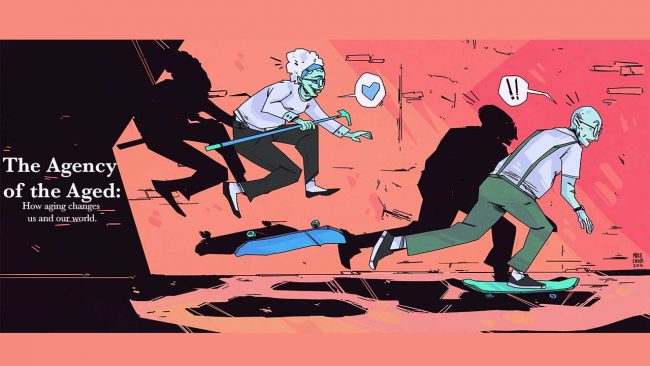
A college campus, like the one where The Common Reader originates, is a strange place, right out of The Twilight Zone, The X-Files, or Orphan Black. Like their science fiction stories, a college campus is a place where no one ages. Or at least the students do not. Each year the oldest people (the seniors) graduate, and they are replaced by a new cohort of young people (the first-year students). The campus remains perennially populated, for the most part, by 18-22 years old. The exception, of course, is the staff and faculty. As those we work with “stay young,” we continue to grow older, year after year. It is hard not to reflect on your own aging in a place like that.
How often do you think about aging? The arrival of the baby boomers has brought attention to the “graying” of our society and the concomitant opportunities and challenges. Something of a national conversation about aging and its implications for our society has unfolded in recent years. But, of course, it is personal too. We watch aging unfold in our friends, our family members, and of course ourselves.
The demographic shift we are all part of right now is unprecedented in human history. For the first time ever there are more older people than younger people on the planet. For the first time ever, family members spend more years taking care of their parents than their children. (Thank you sandwich generation.) And that shift is changing everything about society—health care, housing, transportation, financial services, consumer products, and more. You can say you are part of something big going on.
This issue of The Common Reader will give you an opportunity to reflect on aging, in ways both close and far. There are commentaries on aging in the business world and in politics; reflections on the intersection of ethnic diversity and age; guides to how aging is addressed in movies, films, and books. And, from these writers, many of whom spend their professional lives thinking about aging, there are personal stories about how their understanding of their own place in the lifespan and their years ahead have been altered because of older adults they have known.
Aging represents an exciting nexus of ideas. Its challenges cut across disciplinary boundaries, as do its possibilities. And there is much work to do ahead to ensure that aging is all what we want it to be. So read on and be part of the conversation, part of the change.
